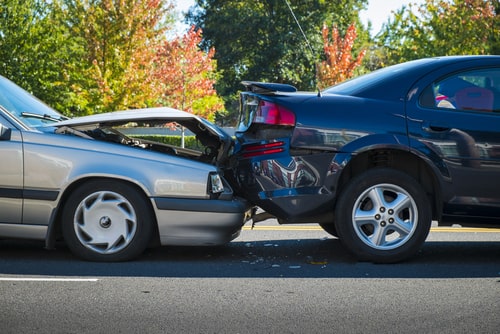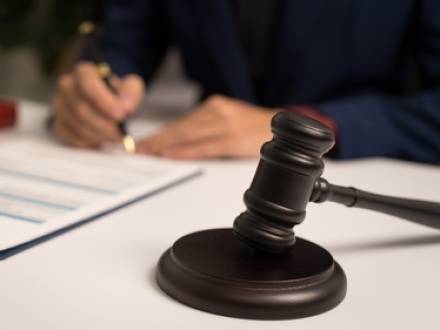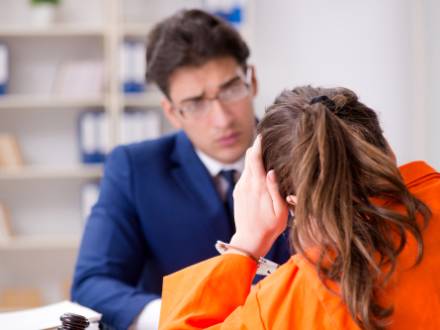Free Consultations 512-474-2222
512-474-2222
Contact Our Firm
The use of the Internet or this form for communication with the firm or any individual member of the firm does not establish an attorney-client relationship. Confidential or time-sensitive information should not be sent through this form.
I have read and understand the Disclaimer and Privacy Policy.

Recent Blog Posts
Can My DWI Be Reduced or Dismissed in Texas?
 In some cases, a DWI charge in Texas can be reduced or even dismissed. However, this usually depends on the strength of the evidence, how the arrest was handled, and whether your rights were protected. Prosecutors often pursue these cases aggressively as we move through 2026, but Morales Law Office, Attorneys at Law, PLLC. can help you build a strong defense.
In some cases, a DWI charge in Texas can be reduced or even dismissed. However, this usually depends on the strength of the evidence, how the arrest was handled, and whether your rights were protected. Prosecutors often pursue these cases aggressively as we move through 2026, but Morales Law Office, Attorneys at Law, PLLC. can help you build a strong defense.
If you were arrested, speaking with a Midland, TX DWI defense lawyer can help you understand your options and what steps may improve the outcome of your case.
Can a DWI Charge Actually Be Reduced or Dismissed?
It is possible for a DWI charge to be reduced or dismissed, but it is never automatic. Prosecutors must prove guilt beyond a reasonable doubt. This is the highest standard in criminal law. If the evidence is weak or there were mistakes in the arrest, your attorney may be able to challenge the case.
Examining Texas Rear-End Accidents
 Texas recorded one reportable motor vehicle crash every 57 seconds in 2025, with rear-end accidents being a common occurrence. These crashes often cause injuries that drivers do not expect at the moment of impact. As of 2026, Texas still uses a fault-based system that directly affects whether compensation is available after a rear-end crash.
Texas recorded one reportable motor vehicle crash every 57 seconds in 2025, with rear-end accidents being a common occurrence. These crashes often cause injuries that drivers do not expect at the moment of impact. As of 2026, Texas still uses a fault-based system that directly affects whether compensation is available after a rear-end crash.
If you were injured in this type of collision, understanding how Texas law applies is important. Our Georgetown, TX car accident lawyers can help explain what steps make sense next.
What Causes Rear-End Accidents in Texas?
Rear-end accidents usually happen when a driver does not leave enough space to stop safely. Under Texas Transportation Code § 545.062, drivers must keep a reasonable and safe following distance based on traffic, speed, and road conditions. When a driver follows too closely and cannot stop in time, that failure often supports a negligence claim.
You Have the Right to Remain Silent
 As of 2026, the right to remain silent remains a core protection under both federal law and Texas criminal procedure. This right applies whether you are stopped on the street, questioned at home, or taken into custody and criminally charged. While many people recognize the phrase, fewer understand how important it is to use it correctly.
As of 2026, the right to remain silent remains a core protection under both federal law and Texas criminal procedure. This right applies whether you are stopped on the street, questioned at home, or taken into custody and criminally charged. While many people recognize the phrase, fewer understand how important it is to use it correctly.
This right comes from a landmark United States Supreme Court case, Miranda v. Arizona. In that case, the Court ruled that police must inform people of their right to remain silent and their right to an attorney before custodial questioning. If those warnings are not given, statements made during questioning may not be used in court.
If you are being questioned or investigated, knowing when and how to use this right matters. Our Midland, TX criminal defense lawyers can help you protect yourself before a situation escalates.
4 Mistakes to Avoid When Facing Criminal Charges in Texas
 Texas courts move criminal cases quickly, which makes early choices especially important. People facing criminal charges in Texas can unintentionally complicate their case by making certain early decisions without understanding the process. Being informed about common mistakes can help protect your rights and preserve options. Our experienced Georgetown, TX criminal defense attorneys can help explain what to expect and which common missteps are best avoided.
Texas courts move criminal cases quickly, which makes early choices especially important. People facing criminal charges in Texas can unintentionally complicate their case by making certain early decisions without understanding the process. Being informed about common mistakes can help protect your rights and preserve options. Our experienced Georgetown, TX criminal defense attorneys can help explain what to expect and which common missteps are best avoided.
Why Early Choices Matter in a Texas Criminal Case
A criminal case begins well before a trial date is set. Texas criminal cases follow procedures set out in the Texas Code of Criminal Procedure. These rules govern arrests, bond, statements, and court deadlines. When someone is unfamiliar with these rules, it is easy to make decisions that later create challenges.
Can I Sue If I was Injured on an Oil Field in Texas?
 The Permian Basin produces millions of barrels of oil each day, and thousands of workers across West Texas face hazards that can lead to serious injuries. If you suffered an injury on the job in an oil field, pursue a workers’ compensation claim or file a lawsuit, depending on the employer’s status and who caused the injury.
The Permian Basin produces millions of barrels of oil each day, and thousands of workers across West Texas face hazards that can lead to serious injuries. If you suffered an injury on the job in an oil field, pursue a workers’ compensation claim or file a lawsuit, depending on the employer’s status and who caused the injury.
As of December 2025, Texas law still allows injured workers to file lawsuits against nonsubscriber employers and third parties whose negligence contributed to an accident.
Oil fields move quickly. Heavy machinery, busy crews, and long shifts create situations where injuries can occur in seconds. Your priority is medical care, but once you are stable, it is important to learn how the law may protect you. Our Midland, TX personal injury lawyers can help you understand who may be responsible.
What Makes an Assault Aggravated in Texas?
 In Texas, assault cases can be classified in different ways depending on the facts involved. When an incident meets the legal definition of aggravated assault, the potential penalties under state law are higher. If you are facing these types of charges, our Georgetown, TX assault defense lawyers will ensure you understand your rights and help you build a strong defense.
In Texas, assault cases can be classified in different ways depending on the facts involved. When an incident meets the legal definition of aggravated assault, the potential penalties under state law are higher. If you are facing these types of charges, our Georgetown, TX assault defense lawyers will ensure you understand your rights and help you build a strong defense.
What Does Texas Law Say About Aggravated Assault?
Under Texas Penal Code § 22.02, aggravated assault occurs when someone causes significant bodily harm to another person through intentional or reckless actions. It can also be when a weapon is used or displayed during an assault. The basic definition of assault comes from § 22.01, and includes causing bodily injury, threatening another person with harm, or making physical contact that a reasonable person would find offensive.
What Is the Difference Between Solicitation and Prostitution in Texas?
 In Texas, solicitation and prostitution are two different crimes, even though they often happen in similar situations. Both acts can lead to felony charges, even if no sexual act takes place. If you have been charged with soliciting a prostitute, our Midland, TX prostitution defense lawyers can help you understand your rights and build your defense.
In Texas, solicitation and prostitution are two different crimes, even though they often happen in similar situations. Both acts can lead to felony charges, even if no sexual act takes place. If you have been charged with soliciting a prostitute, our Midland, TX prostitution defense lawyers can help you understand your rights and build your defense.
How Does Texas Law Define Prostitution and Solicitation?
Under Texas Penal Code § 43.02, prostitution means knowingly offering or agreeing to engage in sexual conduct for a fee. This applies to both the person offering sexual services and the person agreeing to pay. Law enforcement can charge either or both parties involved.
Do You Sue the Truck Driver Directly After a Truck Accident in Texas?
 Texas is an at-fault state. If you are injured in an accident with a semi, whoever is at fault is responsible for the resulting damages. Sometimes, that is the truck driver, but liability in truck accident cases can be complicated. You may even have the right to hold more than one party accountable for your losses. An experienced Georgetown, TX truck accident lawyer can help you sort through these details and ensure you get the compensation you need to recover.
Texas is an at-fault state. If you are injured in an accident with a semi, whoever is at fault is responsible for the resulting damages. Sometimes, that is the truck driver, but liability in truck accident cases can be complicated. You may even have the right to hold more than one party accountable for your losses. An experienced Georgetown, TX truck accident lawyer can help you sort through these details and ensure you get the compensation you need to recover.
When Is the Trucking Company Responsible for an Accident in Texas?
In many cases, the trucking company, not just the driver, can be held responsible for your injuries. Texas recognizes vicarious liability, which means an employer can be held liable for its employee’s negligence that occurs while on the job. If the driver was working during the crash, you may be able to sue the company directly. Even speeding could lead to company liability. Tex. Transp. Code § 545.351 requires drivers to control their speed to avoid collisions. Companies that encourage unsafe delivery schedules can contribute to these violations.
What Is Considered Drug Paraphernalia Under Texas Law?
 Drug paraphernalia charges in Texas can be confusing, especially if no drugs were found. A simple pipe or container seems harmless, but police and prosecutors may argue that these items are signs of illegal activity. If you are facing charges, our Midland, TX drug possession defense lawyers can help. Together, we can build a strong defense based on the facts of your case and challenge the allegations against you.
Drug paraphernalia charges in Texas can be confusing, especially if no drugs were found. A simple pipe or container seems harmless, but police and prosecutors may argue that these items are signs of illegal activity. If you are facing charges, our Midland, TX drug possession defense lawyers can help. Together, we can build a strong defense based on the facts of your case and challenge the allegations against you.
What Counts as Drug Paraphernalia in Texas?
Under Texas Health and Safety Code § 481.002(17), drug paraphernalia means any item used to grow, prepare, test, package, or use illegal drugs. This definition is broad, and can include pipes, bongs, small plastic baggies, scales, rolling papers, syringes, or even everyday items like spoons or foil. What matters most is how the item was used or what it was intended for, not just what it looks like.
What Happens if I Get a DWI With a Child in the Car in Texas?
 Driving while intoxicated (DWI) is always a serious offense, but when a child is in the car, the consequences are far more severe. Texas law automatically treats this as a felony offense, even if it is your first DWI. A conviction can affect nearly every aspect of your life. If you were arrested for DWI, our Georgetown, TX DWI defense lawyers will explain your legal options and fight to protect your rights.
Driving while intoxicated (DWI) is always a serious offense, but when a child is in the car, the consequences are far more severe. Texas law automatically treats this as a felony offense, even if it is your first DWI. A conviction can affect nearly every aspect of your life. If you were arrested for DWI, our Georgetown, TX DWI defense lawyers will explain your legal options and fight to protect your rights.
What Does Texas Law Say About Driving While Intoxicated with a Minor in the Vehicle?
Under Texas Penal Code § 49.045, if you are caught driving while intoxicated when you have a passenger in the car with you who is younger than 15 years old, you can be charged with a state jail felony. This specific category of felony offense carries its own sentencing range and penalties, which are harsher than a misdemeanor DWI but not as severe as higher-level felonies. If you are convicted of DWI with a child passenger, you could face:




